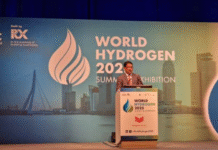Ahmedabad— Adani New Industries Limited (ANIL) has successfully commissioned India’s first off-grid green hydrogen pilot plant with a capacity of 5 megawatts in Kutch, Gujarat, marking a significant milestone in the country’s clean energy transition.
Powered entirely by solar energy and supported by a Battery Energy Storage System (BESS), the state-of-the-art facility operates independently of the power grid. This development introduces a new model for decentralized, renewable-powered hydrogen production.
In a statement released on Monday, the company said the pilot facility features a fully automated, closed-loop electrolyser system designed to dynamically adapt to real-time solar power input. This technology ensures operational efficiency, safety, and performance while compensating for the variability inherent in solar energy.
The project underscores the Adani Group’s broader commitment to innovation, sustainability, and leadership in the emerging green hydrogen sector. It aligns with India’s national goal to become a global hub for green hydrogen and sets a benchmark for renewable-powered industrial applications in hard-to-abate sectors such as fertilizers, refining, and heavy transport.
The Kutch pilot plant also serves as a foundational step for ANIL’s upcoming Green Hydrogen Hub in Mundra, Gujarat—one of the company’s flagship projects aimed at scaling up India’s low-carbon infrastructure.
Green hydrogen is widely recognized as a crucial solution for reducing emissions in energy-intensive industries and is a central pillar in meeting global net-zero targets.
The initiative supports the National Green Hydrogen Mission (NGHM), launched by the Government of India in 2023 with an initial investment of $2.4 billion. The mission aims to reduce the country’s reliance on energy imports, boost self-sufficiency, and fast-track the decarbonization of industrial sectors as part of India’s “Atmanirbhar Bharat” vision.
India’s long-term plan includes not only meeting its domestic green hydrogen demand but also emerging as a major global exporter by 2030. The country has set its sights on achieving energy independence by 2047 and reaching net-zero emissions by 2070. (Source: IANS)








